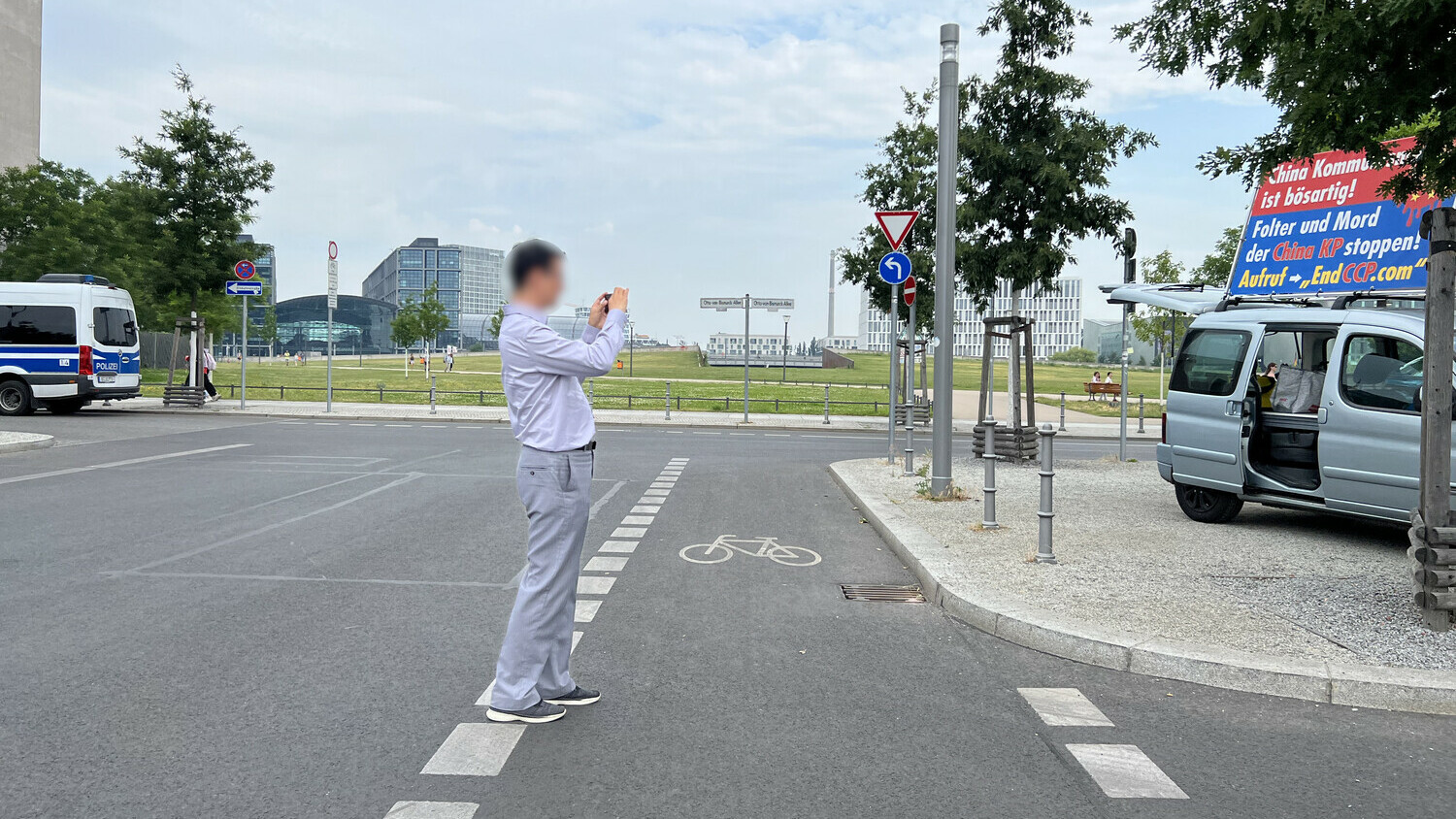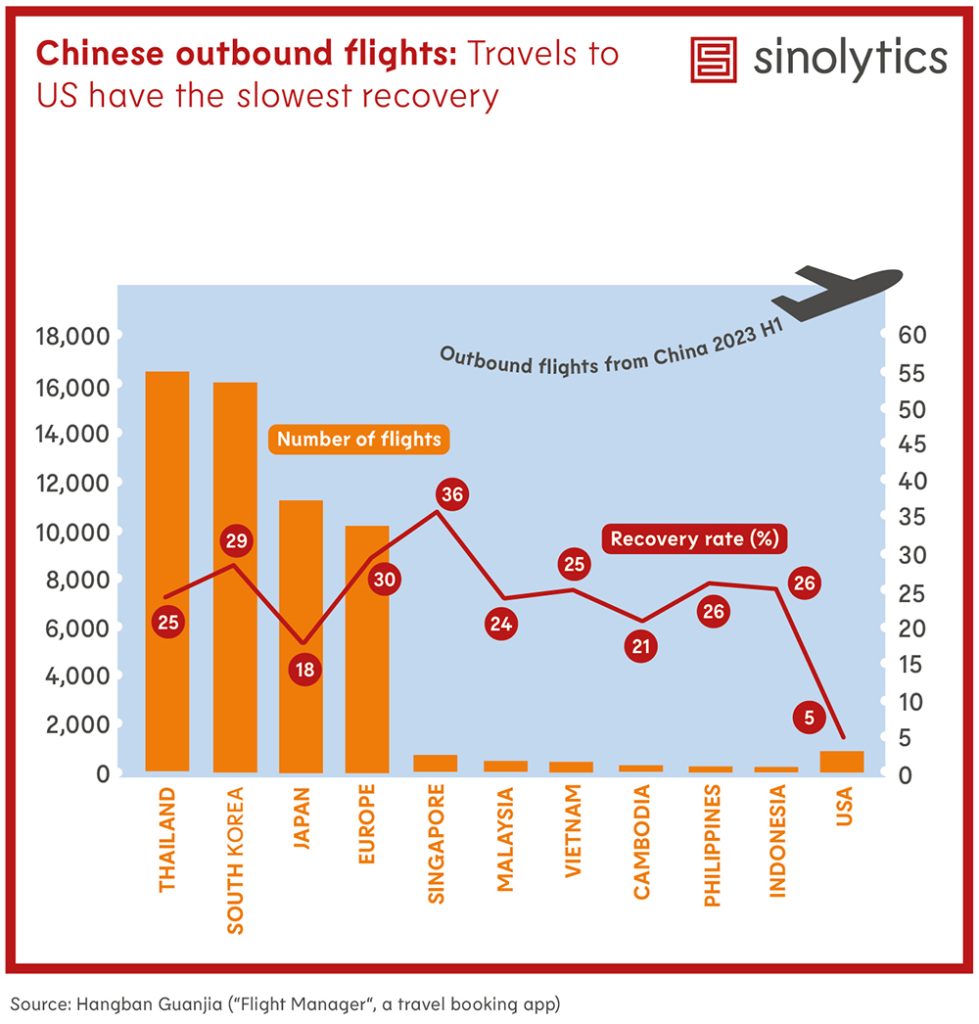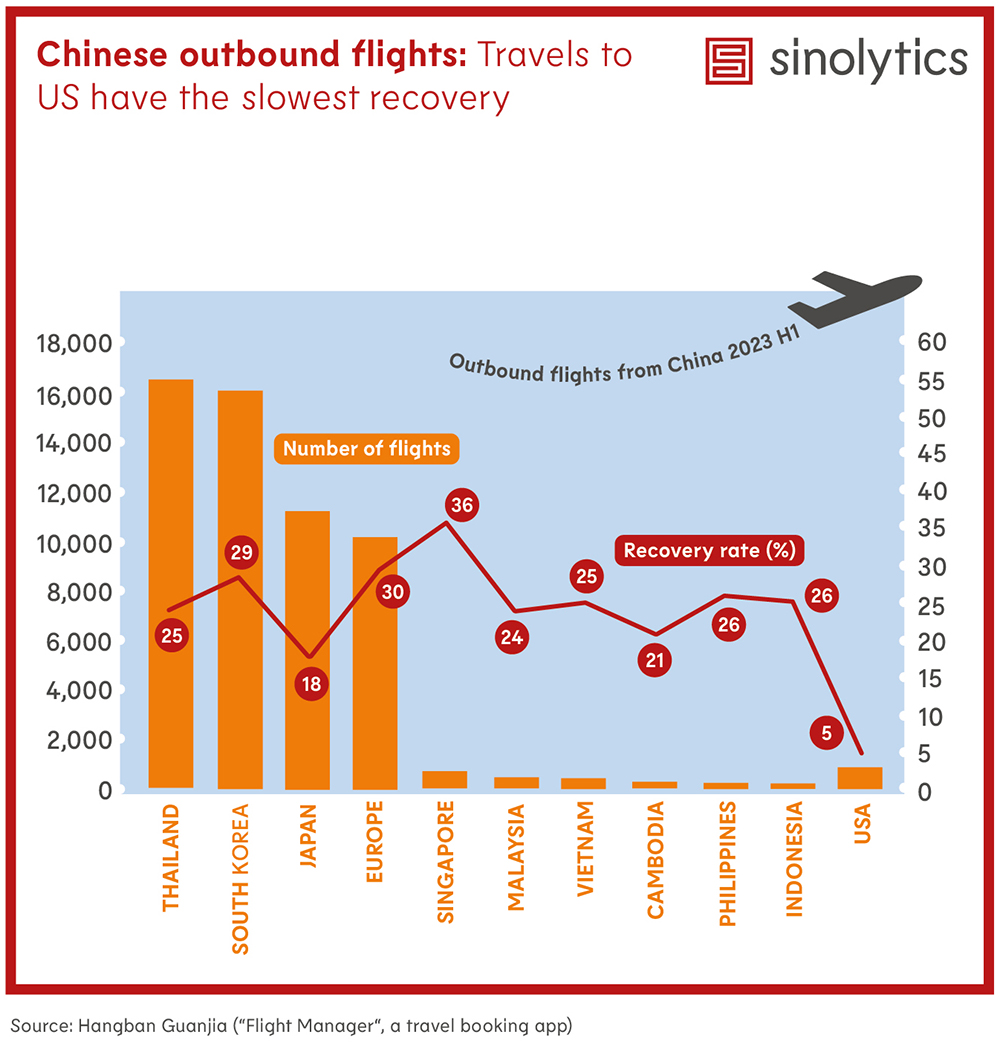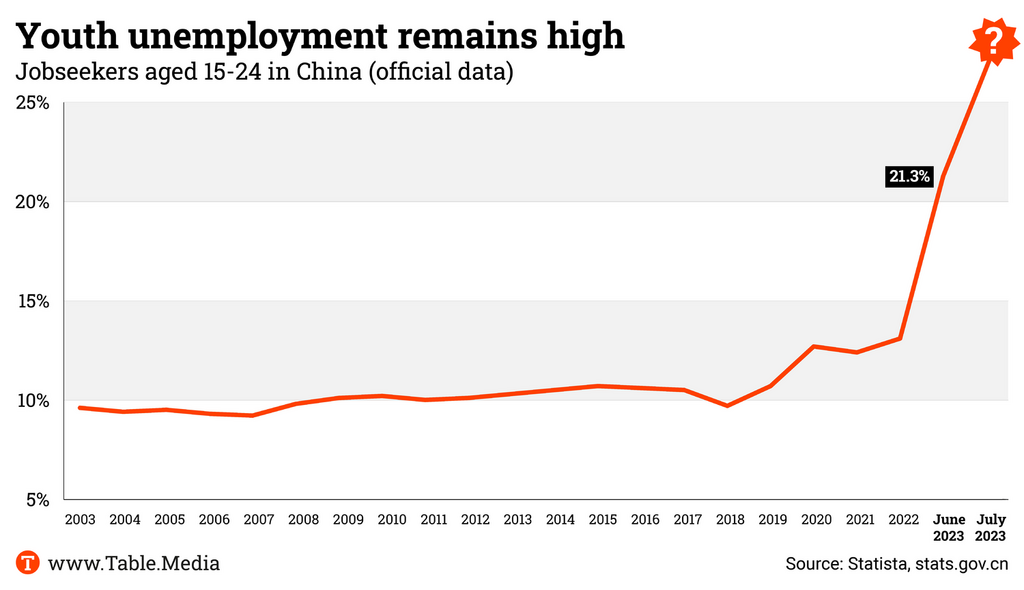The Chinese intelligence service may be operating on German soil. That is at least the most logical explanation for what is happening to democracy activist Su Yutong. Men ring her doorbell and threaten her, and her German address is published on the internet together with explicit pictures.
Other human rights activists notice that they are being photographed by Chinese-looking men at protests in European capitals, writes Fabian Peltsch. There are already calls for an anti-espionage law. It would already help if someone in Germany’s security authorities felt responsible for protecting Chinese dissidents.
Patients in China are accustomed to giving their doctors a present in a red envelope. Then, for instance, the sonography appointment or the operation is a bit sooner. Pharmaceutical companies, in turn, pay handsome reimbursements to chief physicians if their hospital orders their drugs.
Now there is an uprising against such corrupt physicians – and as is so often the case in China, there is already a risk of overdoing it. Fabian Kretschmer reports from Beijing on the witch hunt against doctors, which is already targeting innocent people.


In 2010, Su Yutong fled from China to Germany. In her home country, the authorities targeted the activist, journalist and blogger after she had leaked the diaries of former premier Li Peng. Li Peng was significantly involved in the Tiananmen massacre in 1989.
At first, Su felt safe in Germany. Meanwhile, she feels threatened and pressured here as well. From Germany, she denounces human rights violations committed by the Chinese state, for instance, via the US medium Radio Free Asia. She regularly participates in protests, for example, in front of the Chinese embassy in Berlin, and is one of the few activists of Chinese origin to show her face.
Su has received threatening calls and messages via WhatsApp and Telegram for years. However, the threats have reached a new dimension in the past two years. Unknown men were ringing her doorbell. Someone had uploaded photos of her on sex dating websites along with her home address.
Hotel reservations were made in Su’s name, which were then linked to bomb threats via anonymous tips to the police, similar to those recently made public by Dutch journalist and former China correspondent Marije Vlaskamp. These are attrition tactics aimed at destroying her mental health, Su says.
“The goal of these people is to make me anxious and nervous, and to destroy my social life. But I have told myself that I cannot help them achieve this goal.” So Sus’ strategy is to go on the offense. She makes the harassment and threats public on her social media channels. She talks to the media and contacts police and authorities as often as possible. “I keep calm, that shows them that I am not afraid.”
Still, she is constantly accompanied by a sense of danger. After men kept showing up at her apartment door in Berlin, she contacted the State Criminal Police Office, which advised her to move. Su believes that the Chinese government and the Chinese embassy in Germany were actively involved in spying on her address and that they pay people to put pressure on her.

She says a lot of money has been paid for some hotel reservations made in her name in cities such as Houston, Los Angeles and Istanbul. This is another reason why Su does not believe that individual Chinese patriots, so-called Little Pinks 小粉红, are behind this to teach her a lesson for being a “traitor to China.” She also cites recent cases in which China’s authorities have targeted dissidents using overseas police stations.
Moreover, Chinese-speaking people repeatedly appeared at rallies, blatantly filming them and other participants. Other demonstrators like Tian Ruichen, who studies in the city of Aachen, confirm this: “Especially in a small city like Aachen, participants can be easily identified, even if they wear masks and sunglasses.”
The danger, however, is not only direct local surveillance. Tian believes the authorities also analyze photos on social media channels like WeChat. “These images can be gathered by Chinese internet surveillance to identify participants and monitor protests.”
According to Tian and Su, a common practice is to put additional pressure on relatives of protesters and activists back home in China with phone calls and personal visits. Especially on anniversaries of the Tiananmen massacre or political meetings like the annual People’s Congress, her parents, but also her brother, regularly receive visits from the authorities, Su says. They then brand her as an “anti-China agent” who must be stopped from her activities abroad. Otherwise, serious consequences could follow. “I used to have more contact with my family, but it is becoming less and less. I don’t want to put more pressure on them,” Su says.
When asked by German media this month, the Chinese Embassy in Berlin said the reports of reprisals against Chinese people living in Germany were untrue. “The accusations by those who claimed that they had been harassed, threatened or silenced by China by offering money are pure fabrication and only aim to slander and denigrate China,” SZ and Tagesspiegel quoted from an embassy email.
The newspapers further reported that neither the police nor the intelligence services feel truly responsible in such cases. That is because it is a case of cross-border oppression. “Cases like mine are only regarded by the police as ordinary threats and harassment. I would therefore like to call on the German parliament and government to table a bill under which Chinese agents and their espionage can be stopped and punished,” says Su Yutong.
Otherwise, the door would be opened even more for Beijing to expand its influence without criticism. She says China’s long arm is already felt in German-Chinese friendship associations or the praise of “useful idiots” in the media, the university environment and the business world. “These people are only interested in China’s economy and let democratic values like freedom of expression and human rights fall by the wayside,” Su believes. “One day, democratic countries will pay the price.”

What used to be usually accepted with a shrug is now increasingly ending up in court: corruption in the Chinese health care system. Specifically, it is about underhand money that doctors demand in exchange for faster or better treatment. Illegal contributions from pharmaceutical companies to head physicians also regularly trigger outrage.
The most spectacular cases currently make it to the front pages of the state newspapers almost daily: The vice-president of a hospital in the province of Liaoning allegedly accepted the equivalent of 400,000 euros from a pharmaceutical company to help it win contracts. In southern Yunnan, a head physician received around two million euros to have his hospital buy medical equipment from a specific manufacturer.
At the end of July, the Communist Party’s Central Disciplinary Commission proclaimed an unprecedented campaign against corruption in the health sector. Among other things, local authorities were urged to intensify their prosecutions, targeting high-ranking officials in particular.
Unsurprisingly, heads soon began to roll: By mid-August alone, more than 150 public hospital executives had already been investigated, more than twice as many as in 2022. Several top executives of pharmaceutical companies were also targeted by the regulators and lost their jobs.
Out of a form of preemptive obedience, industry associations have already called off at least eleven medical conferences on short notice this month, as the online medium The Paper reports.
Although no official reasons were given, a connection with the current anti-corruption campaign is obvious: The pharmaceutical industry has deliberately used health conferences to distribute bribes in the form of lecture fees in the past. This is because physicians in Chinese hospitals not only write prescriptions but usually have their own in-house pharmacies, where they have full control over the medicines sold.
In a study published in February, researchers from the renowned Peking University examined the reasons for the widespread corruption. First and foremost, the study authors blamed financial pressure among medical practitioners. “In our district hospital, over 60 percent of doctors are unable to feed their families if they rely solely on their salaries,” one doctor is quoted as saying. Another head doctor says: “If most of my colleagues in my ward receive pay-offs, I cannot refuse them, can I? I will be isolated if I do not follow their example”.
Accordingly, the current anti-corruption campaign will probably mainly fight the symptoms, but not the root of the problem. Without better funding for the health system in the People’s Republic, lasting improvements are unlikely.
It is striking that many publicists are quite skeptical about the authorities’ measures. Hu Xijin, former editor-in-chief of the nationalist Global Times, warns, “We should comprehensively ensure that the fight against corruption is carried out within the legal framework. This is not a so-called mass movement”.
Hu’s criticism alludes to the radical campaigns of the 1960s under state founder Mao Zedong, which vastly overshot their intended goal.
Such a concern is entirely justified. The online platform Weibo already shows a veritable witch hunt against healthcare workers. Users denounce countless doctors by name – and accuse them of serious corruption without providing any evidence.
Many innocent people are also likely to be targeted in the process: A cardiologist, for instance, reports in an online post that a patient recently reported him for alleged corruption and was subsequently stripped of his annual bonus. The accusation: After an operation, A patient thanked the hospital staff with a few lunch boxes and lattes. Fabian Kretschmer


Sinolytics is a European research-based consultancy entirely focused on China. It advises European companies on their strategic orientation and concrete business activities in the People’s Republic.
Chinese statisticians have stopped reporting youth unemployment. They now only publish the overall unemployment rate and, with the July figures, stopped breaking it down by age. Unemployment among 16- to 24-year-olds has surged recently. Observers see the changes in the statistics as an attempt to downplay the significant problems young people face in the job market.

The National Bureau of Statistics justified the omission on Tuesday by saying that “society and the economy are constantly evolving” and that the old counting method was outdated since most 16 to 24-year-olds are still in training, school or university and spend more time enjoying their youth. A spokesperson admitted, however, that the figure – if it had been published – would have been particularly high in July due to seasonal factors. fin
The dispute between the German Federal Ministry of the Interior and the mobile network operators Deutsche Telekom, Vodafone and Telefónica could be close to a resolution, reports the German business newspaper Handelsblatt, citing industry circles. A “minimally invasive solution” would prevent the high costs of an extensive, expensive and lengthy technology replacement.
According to the possible compromise, the companies in question would only have to replace certain sensitive parts in their networks. This would affect the so-called network management components and the Huawei software used for them. The Federal Ministry of the Interior classifies these as particularly vulnerable and therefore “critical.”
The far more numerous antennas from the Chinese manufacturer could remain in place. The European Commission has been urging network operators and member states for years to refrain from using mobile technology from the People’s Republic. cyb
The relevance of German goods on the European market is declining. Chinese products, on the other hand, are becoming increasingly important. This is revealed by a new study by the Institute of the German Economy (IW): At the turn of the millennium, German products still accounted for around 14 percent of total EU imports. Last year, this share fell to 12.5 percent. In contrast, Chinese goods increased from 2.6 to 8.8 percent.
Particularly affected are supposed German export hits such as machinery, chemical products, metal products or cars. The German lead of over 15 percentage points had shrunk to 2.5 percentage points by 2022. In computers and other electrical and optical equipment, the People’s Republic has even overtaken Germany. Here, the Chinese share rose from 4.5 to 27.4 percent, while the German share fell from 10.7 to 9.3. “The German export model seems to be increasingly faltering,” study author and foreign trade expert Juergen Matthes commented on these findings. cyb
The world’s second-largest EV manufacturer BYD apparently wants to develop the technology for self-driving vehicles on its own, after all, instead of teaming up with AI company Baidu. Last year, BYD announced that it wanted to climb the next levels of autonomous driving with Baidu. Robo-taxis from BYD’s Apollo division already drive autonomously with Baidu technology.
The news is considered a heavy blow to Baidu. The Beijing-based company currently positions itself as a provider of IT for the automotive industry. Baidu started out as a search engine operator, but now sees itself as a universal provider of AI solutions for various industries.
For instance, Baidu already provides its services to BYD rival Geely. But cooperation with BYD would have been an even more valuable credential. Baidu has already developed a robo-truck on its own. fin
China’s birth rate dropped to a record low of 1.09 last year, National Business Daily reported on Tuesday. Last year it was 1.16. This means that the number of newborns is dropping even faster than feared. In the future, a lack of workforce could weigh on the economy.
Out of concern over China’s population decline over six decades and the rapid aging of society, Beijing is attempting to increase the birth rate through a number of measures, including financial incentives and improved childcare facilities. rtr/fin

The German government has entitled its recently presented China strategy “Partner, Competitor, Systemic Rival” in the introduction. The classification of our most important trading partner as “partner” and “competitor” is a matter of course. But what “systemic rival” actually means and is supposed to achieve is not apparent. This term, we should not fool ourselves, sounds like suspicion, demarcation, perhaps even hostility, but certainly not cooperation. It burdens talks and poisons the atmosphere. But a part of the government apparently did not want it any other way.
This is also how the China strategy has been interpreted in China, and not only there. The bang with which the city of Kiel abruptly slammed the door on its intended partner city Qingdao after years of preparation is just as much an example as the termination of the 20-year cooperation between the University of Erlangen-Nuremberg and the China Scholarship Council for financing Chinese doctoral students. The responsible minister justified the procedure ex-post by citing the risk of espionage. In the meantime, KfW (Germany’s state-owned investment and development bank) has announced, apparently under pressure from the Economy and Foreign Affairs Ministries, that it will no longer fund joint climate and energy projects with China after 2024.
The China strategy justifies “systemic rivalry” by stating that “Germany and China have different concepts of the principles governing the international order in important areas.” (p. 10). The German government expresses concern about China’s efforts “to influence the international order in line with the interests of its single-party system and thus to relativize the foundations of the rules-based international order, such as the status of human rights” (ibid.). Furthermore, it complains that China is underlining its “Chinese concepts of global order,” is expanding its “relationship with Russia,” is striving for “regional hegemony” in the Indo-Pacific, is using its economic power to pursue “political goals,” is spending “the most on defense” after the United States, and is placing “its own interests above multilateral principles” in the United Nations (p. 55). In other respects, the usual prejudices are cultivated, for example, that the Silk Road Initiative would solidify “political dependencies” (p. 48).
Assuming that everything was true, would that be a reason for Germany to consider China a “systemic rival?” Are we in any sense in a struggle with China for global order, as the strategy suggests?
Two considerations, in particular, speak against this. First, the international world order must change. It is paramount for a peaceful, rule-based and functioning order that China – as well as India, South America and Africa – sit at the table as equal co-architects in developing the new order. With all the foreseeable difficulties, it cannot be expected that 90 percent of the world population will let 10 percent dictate the development of this order.
Second, unlike the United States, which has brought the concept of “systemic rivalry” into play, the German Federal Republic does not have the international political influence and resources. And indeed, it is the United States and China that will foreseeably stand as the main protagonists in the struggle for a new order, not Germany, nor Europe. The struggle for world order will be waged between the established and the emerging superpower. Germany’s role in the struggle is to represent its own and Europe’s interests.
This is not pusillanimous and cowering, but simply realistic, even if it may not be enough for a moralizing German foreign policy, which likes to play the role of supreme teacher on the international stage. We are not in a “world civil war” of systems, neither against China nor other authoritarian regimes.
China is a sovereign nation. The legitimacy of its government and, thus, its statehood is primarily a national matter. The German Foreign Ministry should accept China’s statehood as a political reality not only formally but also practically. It is not a matter of taking “positions” but of practicing diplomacy, as recently demonstrated again by the grand master Henry Kissinger during his visit to Beijing.
Incidentally, the entire document does not mention how China, despite its phenomenal rise over the past 45 years, is still marginalized in the Western-dominated international order of the Bretton Woods institutions and kept down in relation to the country’s history, size and economic significance. Prime examples are the International Monetary Fund (IMF) and the World Bank, whose respective chairs are shared between the EU and the US. In the IMF, China has a voting right of just over 6 percent, which is less (!) than Japan and only slightly more than Germany, although the country’s gross domestic product is four times higher. Moreover, the United States alone and the EU states each have a blocking minority.
So much for the “rules-based world order,” which in reality continues to be dominated by the West, a fact that is increasingly being met with incomprehension not only in China, as is well known. It should come as no surprise that China, for instance, is building up its own international infrastructure by establishing the Asian Infrastructure Investment Bank (AIIB). This has absolutely nothing to do with influencing “the international order in line with the interests of its single-party system and thus to relativize the foundations of the rules-based international order, such as the status of human rights.”
In this context, it should also be remembered that unlike Russia (!), China was denied market economy status in 2016 on unsubstantiated grounds, which was agreed upon when it joined the World Trade Organization in 2001. Also, it was not China but US President Trump who started the trade war in 2018, which has now been further exacerbated and expanded by the Biden administration by restricting technology exports to China. The recent decision to prohibit US investment in Chinese semiconductors, quantum computing and artificial intelligence speaks volumes.
The strategy’s reference to China having the second-highest military spending in the world after the United States is accurate, but it understates – knowingly or unknowingly – the relevant magnitude of the differences: In 2022, US military spending was more than two times higher than China’s, and if NATO is included, even four times higher.
It is certainly not wrong that China, as it goes on to state, is striving for “regional hegemony” in the Indo-Pacific. However, the authors themselves will probably know why it is not mentioned that Australia, the United Kingdom and the United States, united in the so-called, newly founded AUKUS pact, which is in the process of providing Australia with nuclear submarines, are also massively arming themselves against China in this region. It also fits in with the fact that the Biden administration has recently announced that it will supply Taiwan with weapons from its stockpile for the first time in its history.
Which superpower has more reason to believe it is threatened by the other is debatable. After all, vastly superior American warships are cruising the entire Western Pacific on China’s doorstep, not the other way around. The Thucydides trap sends its regards.
It is urgently advised for Germany to safeguard its interests internationally. Acting as the world’s arbiter of political systems and lecturing other nations with our values is entirely inappropriate and grossly overestimates our importance and strength. What we need are stable relations with China – in truth, with everyone, but especially with China – that promote the prosperity of our country, employees and employers, and peace in the world.
No global problem can be solved without or against China, least of all climate change. The fact that we represent our values, such as human rights and democracy, is a matter of course and not a criterion for excluding others.
Rolf D. Cremer was Dean and Vice President of the China Europe International Business School in Shanghai, Horst Loechel is Professor of Economics and heads the Sino-German Center at the Frankfurt School of Finance & Management.
Bernd Bornhauser is moving from Mercedes-Benz China in Beijing back to Mercedes-AMG in Baden-Wuerttemberg, where he has been working as Head of Product/Lifecycle Management, Accessories & Collection since August.
Jens Pabel has been working in Changchung as a construction site manager for Audi China since August. Previously, he was employed as a site coordinator for HLS Sacha in Foshan and Tianjin.
Is something changing in your organization? Let us know at heads@table.media!

Environmental conservation from a bird’s-eye view: Volunteers recover objects from the water in the Donghu Wetland in southwest China’s Guizhou Province on the first National Ecology Day.
In China.Table issue #646 of August 15, 2023, we stated that RWE was operating a the “Nordseecluster”, a group of offshore wind farms, jointly with the Canadian company Northland Power. This is no longer true: The wind farm is owned exclusively by RWE as of May 2023. We apologize for the error.
The Chinese intelligence service may be operating on German soil. That is at least the most logical explanation for what is happening to democracy activist Su Yutong. Men ring her doorbell and threaten her, and her German address is published on the internet together with explicit pictures.
Other human rights activists notice that they are being photographed by Chinese-looking men at protests in European capitals, writes Fabian Peltsch. There are already calls for an anti-espionage law. It would already help if someone in Germany’s security authorities felt responsible for protecting Chinese dissidents.
Patients in China are accustomed to giving their doctors a present in a red envelope. Then, for instance, the sonography appointment or the operation is a bit sooner. Pharmaceutical companies, in turn, pay handsome reimbursements to chief physicians if their hospital orders their drugs.
Now there is an uprising against such corrupt physicians – and as is so often the case in China, there is already a risk of overdoing it. Fabian Kretschmer reports from Beijing on the witch hunt against doctors, which is already targeting innocent people.


In 2010, Su Yutong fled from China to Germany. In her home country, the authorities targeted the activist, journalist and blogger after she had leaked the diaries of former premier Li Peng. Li Peng was significantly involved in the Tiananmen massacre in 1989.
At first, Su felt safe in Germany. Meanwhile, she feels threatened and pressured here as well. From Germany, she denounces human rights violations committed by the Chinese state, for instance, via the US medium Radio Free Asia. She regularly participates in protests, for example, in front of the Chinese embassy in Berlin, and is one of the few activists of Chinese origin to show her face.
Su has received threatening calls and messages via WhatsApp and Telegram for years. However, the threats have reached a new dimension in the past two years. Unknown men were ringing her doorbell. Someone had uploaded photos of her on sex dating websites along with her home address.
Hotel reservations were made in Su’s name, which were then linked to bomb threats via anonymous tips to the police, similar to those recently made public by Dutch journalist and former China correspondent Marije Vlaskamp. These are attrition tactics aimed at destroying her mental health, Su says.
“The goal of these people is to make me anxious and nervous, and to destroy my social life. But I have told myself that I cannot help them achieve this goal.” So Sus’ strategy is to go on the offense. She makes the harassment and threats public on her social media channels. She talks to the media and contacts police and authorities as often as possible. “I keep calm, that shows them that I am not afraid.”
Still, she is constantly accompanied by a sense of danger. After men kept showing up at her apartment door in Berlin, she contacted the State Criminal Police Office, which advised her to move. Su believes that the Chinese government and the Chinese embassy in Germany were actively involved in spying on her address and that they pay people to put pressure on her.

She says a lot of money has been paid for some hotel reservations made in her name in cities such as Houston, Los Angeles and Istanbul. This is another reason why Su does not believe that individual Chinese patriots, so-called Little Pinks 小粉红, are behind this to teach her a lesson for being a “traitor to China.” She also cites recent cases in which China’s authorities have targeted dissidents using overseas police stations.
Moreover, Chinese-speaking people repeatedly appeared at rallies, blatantly filming them and other participants. Other demonstrators like Tian Ruichen, who studies in the city of Aachen, confirm this: “Especially in a small city like Aachen, participants can be easily identified, even if they wear masks and sunglasses.”
The danger, however, is not only direct local surveillance. Tian believes the authorities also analyze photos on social media channels like WeChat. “These images can be gathered by Chinese internet surveillance to identify participants and monitor protests.”
According to Tian and Su, a common practice is to put additional pressure on relatives of protesters and activists back home in China with phone calls and personal visits. Especially on anniversaries of the Tiananmen massacre or political meetings like the annual People’s Congress, her parents, but also her brother, regularly receive visits from the authorities, Su says. They then brand her as an “anti-China agent” who must be stopped from her activities abroad. Otherwise, serious consequences could follow. “I used to have more contact with my family, but it is becoming less and less. I don’t want to put more pressure on them,” Su says.
When asked by German media this month, the Chinese Embassy in Berlin said the reports of reprisals against Chinese people living in Germany were untrue. “The accusations by those who claimed that they had been harassed, threatened or silenced by China by offering money are pure fabrication and only aim to slander and denigrate China,” SZ and Tagesspiegel quoted from an embassy email.
The newspapers further reported that neither the police nor the intelligence services feel truly responsible in such cases. That is because it is a case of cross-border oppression. “Cases like mine are only regarded by the police as ordinary threats and harassment. I would therefore like to call on the German parliament and government to table a bill under which Chinese agents and their espionage can be stopped and punished,” says Su Yutong.
Otherwise, the door would be opened even more for Beijing to expand its influence without criticism. She says China’s long arm is already felt in German-Chinese friendship associations or the praise of “useful idiots” in the media, the university environment and the business world. “These people are only interested in China’s economy and let democratic values like freedom of expression and human rights fall by the wayside,” Su believes. “One day, democratic countries will pay the price.”

What used to be usually accepted with a shrug is now increasingly ending up in court: corruption in the Chinese health care system. Specifically, it is about underhand money that doctors demand in exchange for faster or better treatment. Illegal contributions from pharmaceutical companies to head physicians also regularly trigger outrage.
The most spectacular cases currently make it to the front pages of the state newspapers almost daily: The vice-president of a hospital in the province of Liaoning allegedly accepted the equivalent of 400,000 euros from a pharmaceutical company to help it win contracts. In southern Yunnan, a head physician received around two million euros to have his hospital buy medical equipment from a specific manufacturer.
At the end of July, the Communist Party’s Central Disciplinary Commission proclaimed an unprecedented campaign against corruption in the health sector. Among other things, local authorities were urged to intensify their prosecutions, targeting high-ranking officials in particular.
Unsurprisingly, heads soon began to roll: By mid-August alone, more than 150 public hospital executives had already been investigated, more than twice as many as in 2022. Several top executives of pharmaceutical companies were also targeted by the regulators and lost their jobs.
Out of a form of preemptive obedience, industry associations have already called off at least eleven medical conferences on short notice this month, as the online medium The Paper reports.
Although no official reasons were given, a connection with the current anti-corruption campaign is obvious: The pharmaceutical industry has deliberately used health conferences to distribute bribes in the form of lecture fees in the past. This is because physicians in Chinese hospitals not only write prescriptions but usually have their own in-house pharmacies, where they have full control over the medicines sold.
In a study published in February, researchers from the renowned Peking University examined the reasons for the widespread corruption. First and foremost, the study authors blamed financial pressure among medical practitioners. “In our district hospital, over 60 percent of doctors are unable to feed their families if they rely solely on their salaries,” one doctor is quoted as saying. Another head doctor says: “If most of my colleagues in my ward receive pay-offs, I cannot refuse them, can I? I will be isolated if I do not follow their example”.
Accordingly, the current anti-corruption campaign will probably mainly fight the symptoms, but not the root of the problem. Without better funding for the health system in the People’s Republic, lasting improvements are unlikely.
It is striking that many publicists are quite skeptical about the authorities’ measures. Hu Xijin, former editor-in-chief of the nationalist Global Times, warns, “We should comprehensively ensure that the fight against corruption is carried out within the legal framework. This is not a so-called mass movement”.
Hu’s criticism alludes to the radical campaigns of the 1960s under state founder Mao Zedong, which vastly overshot their intended goal.
Such a concern is entirely justified. The online platform Weibo already shows a veritable witch hunt against healthcare workers. Users denounce countless doctors by name – and accuse them of serious corruption without providing any evidence.
Many innocent people are also likely to be targeted in the process: A cardiologist, for instance, reports in an online post that a patient recently reported him for alleged corruption and was subsequently stripped of his annual bonus. The accusation: After an operation, A patient thanked the hospital staff with a few lunch boxes and lattes. Fabian Kretschmer


Sinolytics is a European research-based consultancy entirely focused on China. It advises European companies on their strategic orientation and concrete business activities in the People’s Republic.
Chinese statisticians have stopped reporting youth unemployment. They now only publish the overall unemployment rate and, with the July figures, stopped breaking it down by age. Unemployment among 16- to 24-year-olds has surged recently. Observers see the changes in the statistics as an attempt to downplay the significant problems young people face in the job market.

The National Bureau of Statistics justified the omission on Tuesday by saying that “society and the economy are constantly evolving” and that the old counting method was outdated since most 16 to 24-year-olds are still in training, school or university and spend more time enjoying their youth. A spokesperson admitted, however, that the figure – if it had been published – would have been particularly high in July due to seasonal factors. fin
The dispute between the German Federal Ministry of the Interior and the mobile network operators Deutsche Telekom, Vodafone and Telefónica could be close to a resolution, reports the German business newspaper Handelsblatt, citing industry circles. A “minimally invasive solution” would prevent the high costs of an extensive, expensive and lengthy technology replacement.
According to the possible compromise, the companies in question would only have to replace certain sensitive parts in their networks. This would affect the so-called network management components and the Huawei software used for them. The Federal Ministry of the Interior classifies these as particularly vulnerable and therefore “critical.”
The far more numerous antennas from the Chinese manufacturer could remain in place. The European Commission has been urging network operators and member states for years to refrain from using mobile technology from the People’s Republic. cyb
The relevance of German goods on the European market is declining. Chinese products, on the other hand, are becoming increasingly important. This is revealed by a new study by the Institute of the German Economy (IW): At the turn of the millennium, German products still accounted for around 14 percent of total EU imports. Last year, this share fell to 12.5 percent. In contrast, Chinese goods increased from 2.6 to 8.8 percent.
Particularly affected are supposed German export hits such as machinery, chemical products, metal products or cars. The German lead of over 15 percentage points had shrunk to 2.5 percentage points by 2022. In computers and other electrical and optical equipment, the People’s Republic has even overtaken Germany. Here, the Chinese share rose from 4.5 to 27.4 percent, while the German share fell from 10.7 to 9.3. “The German export model seems to be increasingly faltering,” study author and foreign trade expert Juergen Matthes commented on these findings. cyb
The world’s second-largest EV manufacturer BYD apparently wants to develop the technology for self-driving vehicles on its own, after all, instead of teaming up with AI company Baidu. Last year, BYD announced that it wanted to climb the next levels of autonomous driving with Baidu. Robo-taxis from BYD’s Apollo division already drive autonomously with Baidu technology.
The news is considered a heavy blow to Baidu. The Beijing-based company currently positions itself as a provider of IT for the automotive industry. Baidu started out as a search engine operator, but now sees itself as a universal provider of AI solutions for various industries.
For instance, Baidu already provides its services to BYD rival Geely. But cooperation with BYD would have been an even more valuable credential. Baidu has already developed a robo-truck on its own. fin
China’s birth rate dropped to a record low of 1.09 last year, National Business Daily reported on Tuesday. Last year it was 1.16. This means that the number of newborns is dropping even faster than feared. In the future, a lack of workforce could weigh on the economy.
Out of concern over China’s population decline over six decades and the rapid aging of society, Beijing is attempting to increase the birth rate through a number of measures, including financial incentives and improved childcare facilities. rtr/fin

The German government has entitled its recently presented China strategy “Partner, Competitor, Systemic Rival” in the introduction. The classification of our most important trading partner as “partner” and “competitor” is a matter of course. But what “systemic rival” actually means and is supposed to achieve is not apparent. This term, we should not fool ourselves, sounds like suspicion, demarcation, perhaps even hostility, but certainly not cooperation. It burdens talks and poisons the atmosphere. But a part of the government apparently did not want it any other way.
This is also how the China strategy has been interpreted in China, and not only there. The bang with which the city of Kiel abruptly slammed the door on its intended partner city Qingdao after years of preparation is just as much an example as the termination of the 20-year cooperation between the University of Erlangen-Nuremberg and the China Scholarship Council for financing Chinese doctoral students. The responsible minister justified the procedure ex-post by citing the risk of espionage. In the meantime, KfW (Germany’s state-owned investment and development bank) has announced, apparently under pressure from the Economy and Foreign Affairs Ministries, that it will no longer fund joint climate and energy projects with China after 2024.
The China strategy justifies “systemic rivalry” by stating that “Germany and China have different concepts of the principles governing the international order in important areas.” (p. 10). The German government expresses concern about China’s efforts “to influence the international order in line with the interests of its single-party system and thus to relativize the foundations of the rules-based international order, such as the status of human rights” (ibid.). Furthermore, it complains that China is underlining its “Chinese concepts of global order,” is expanding its “relationship with Russia,” is striving for “regional hegemony” in the Indo-Pacific, is using its economic power to pursue “political goals,” is spending “the most on defense” after the United States, and is placing “its own interests above multilateral principles” in the United Nations (p. 55). In other respects, the usual prejudices are cultivated, for example, that the Silk Road Initiative would solidify “political dependencies” (p. 48).
Assuming that everything was true, would that be a reason for Germany to consider China a “systemic rival?” Are we in any sense in a struggle with China for global order, as the strategy suggests?
Two considerations, in particular, speak against this. First, the international world order must change. It is paramount for a peaceful, rule-based and functioning order that China – as well as India, South America and Africa – sit at the table as equal co-architects in developing the new order. With all the foreseeable difficulties, it cannot be expected that 90 percent of the world population will let 10 percent dictate the development of this order.
Second, unlike the United States, which has brought the concept of “systemic rivalry” into play, the German Federal Republic does not have the international political influence and resources. And indeed, it is the United States and China that will foreseeably stand as the main protagonists in the struggle for a new order, not Germany, nor Europe. The struggle for world order will be waged between the established and the emerging superpower. Germany’s role in the struggle is to represent its own and Europe’s interests.
This is not pusillanimous and cowering, but simply realistic, even if it may not be enough for a moralizing German foreign policy, which likes to play the role of supreme teacher on the international stage. We are not in a “world civil war” of systems, neither against China nor other authoritarian regimes.
China is a sovereign nation. The legitimacy of its government and, thus, its statehood is primarily a national matter. The German Foreign Ministry should accept China’s statehood as a political reality not only formally but also practically. It is not a matter of taking “positions” but of practicing diplomacy, as recently demonstrated again by the grand master Henry Kissinger during his visit to Beijing.
Incidentally, the entire document does not mention how China, despite its phenomenal rise over the past 45 years, is still marginalized in the Western-dominated international order of the Bretton Woods institutions and kept down in relation to the country’s history, size and economic significance. Prime examples are the International Monetary Fund (IMF) and the World Bank, whose respective chairs are shared between the EU and the US. In the IMF, China has a voting right of just over 6 percent, which is less (!) than Japan and only slightly more than Germany, although the country’s gross domestic product is four times higher. Moreover, the United States alone and the EU states each have a blocking minority.
So much for the “rules-based world order,” which in reality continues to be dominated by the West, a fact that is increasingly being met with incomprehension not only in China, as is well known. It should come as no surprise that China, for instance, is building up its own international infrastructure by establishing the Asian Infrastructure Investment Bank (AIIB). This has absolutely nothing to do with influencing “the international order in line with the interests of its single-party system and thus to relativize the foundations of the rules-based international order, such as the status of human rights.”
In this context, it should also be remembered that unlike Russia (!), China was denied market economy status in 2016 on unsubstantiated grounds, which was agreed upon when it joined the World Trade Organization in 2001. Also, it was not China but US President Trump who started the trade war in 2018, which has now been further exacerbated and expanded by the Biden administration by restricting technology exports to China. The recent decision to prohibit US investment in Chinese semiconductors, quantum computing and artificial intelligence speaks volumes.
The strategy’s reference to China having the second-highest military spending in the world after the United States is accurate, but it understates – knowingly or unknowingly – the relevant magnitude of the differences: In 2022, US military spending was more than two times higher than China’s, and if NATO is included, even four times higher.
It is certainly not wrong that China, as it goes on to state, is striving for “regional hegemony” in the Indo-Pacific. However, the authors themselves will probably know why it is not mentioned that Australia, the United Kingdom and the United States, united in the so-called, newly founded AUKUS pact, which is in the process of providing Australia with nuclear submarines, are also massively arming themselves against China in this region. It also fits in with the fact that the Biden administration has recently announced that it will supply Taiwan with weapons from its stockpile for the first time in its history.
Which superpower has more reason to believe it is threatened by the other is debatable. After all, vastly superior American warships are cruising the entire Western Pacific on China’s doorstep, not the other way around. The Thucydides trap sends its regards.
It is urgently advised for Germany to safeguard its interests internationally. Acting as the world’s arbiter of political systems and lecturing other nations with our values is entirely inappropriate and grossly overestimates our importance and strength. What we need are stable relations with China – in truth, with everyone, but especially with China – that promote the prosperity of our country, employees and employers, and peace in the world.
No global problem can be solved without or against China, least of all climate change. The fact that we represent our values, such as human rights and democracy, is a matter of course and not a criterion for excluding others.
Rolf D. Cremer was Dean and Vice President of the China Europe International Business School in Shanghai, Horst Loechel is Professor of Economics and heads the Sino-German Center at the Frankfurt School of Finance & Management.
Bernd Bornhauser is moving from Mercedes-Benz China in Beijing back to Mercedes-AMG in Baden-Wuerttemberg, where he has been working as Head of Product/Lifecycle Management, Accessories & Collection since August.
Jens Pabel has been working in Changchung as a construction site manager for Audi China since August. Previously, he was employed as a site coordinator for HLS Sacha in Foshan and Tianjin.
Is something changing in your organization? Let us know at heads@table.media!

Environmental conservation from a bird’s-eye view: Volunteers recover objects from the water in the Donghu Wetland in southwest China’s Guizhou Province on the first National Ecology Day.
In China.Table issue #646 of August 15, 2023, we stated that RWE was operating a the “Nordseecluster”, a group of offshore wind farms, jointly with the Canadian company Northland Power. This is no longer true: The wind farm is owned exclusively by RWE as of May 2023. We apologize for the error.
